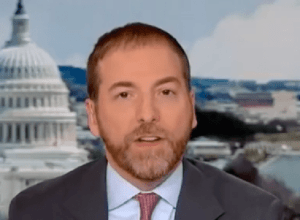America Is on the Road to Becoming a Fascist State
Yale philosophy professor Jason Stanley reflects on Trump's ultranationalism and the eerie parallels between the U.S. and pre-war Germany. Tabitha Kaylee Hawk / Flickr
Tabitha Kaylee Hawk / Flickr
Listen to the full interview or read the transcript below:
Robert Scheer: Hi, I’m Robert Scheer, and this is another edition of Scheer Intelligence, where the intelligence comes from my guests. In this case, Jason Stanley, who has written a book called “How Fascism Works: The Politics of Us and Them,” published by Random House. And you teach at Yale, right? And you’ve written a number of interesting books about propaganda, and this fits in. The basic hook here is Trump, and people being frightened about the echoes of fascism, not only in this country but throughout the world. And your book attempts to examine the architecture of fascism, its origins and so forth.
Jason Stanley: Though I would say that though the hook is Trump I agree with President Obama that Trump is a symptom and not a cause.
RS: The interesting thing about your book is you really talk about society in disarray. There’s an emotional feeling behind this, that what happens when societies fall apart, and when authoritarian figures hold up a notion of law and order, and the proper nationalism. And basically what we’re talking about is mythology, and that’s the Trump connection; they develop a mythology about the past, and about when Germany was great; now we have when America was great. And they use that as a springboard for basically developing an us-them philosophy. Is that not the basic architecture?
JS: That’s the basic architecture. In “How Fascism Works,” however, what I’m trying to do is I’m trying to sort of draw attention to the fact that there are familiar aspects of fascist politics that have always been here, and to which our country has always been vulnerable. One thing about coming from my Holocaust background—my parents are both survivors, were refugees; they weren’t in camps, but they were refugees—they were always attendant to these details. And even more so because my mother was a court stenographer in Manhattan district court, in criminal court, so she could see some of these features up front. And she would often note the similarities between what was happening with racism in the United States, and what faced Jewish people in Poland, which she experienced as a young child. She would note, you know, they’re targeting black Americans here. James Baldwin has a classic piece called “Negroes are Anti-Semitic Because They’re Anti-White.” And in it he says, “You think—addressing Jewish-Americans like myself—You think that you’re closer to us because of our shared history of oppression. But our shared history of oppression makes us dislike you more, because we know you’re glad not to be us. We know you understand what we face, and you’re glad not to be us.”
Our history of racism makes us especially vulnerable to certain elemental features of fascist politics. For example, fake news. I mean, fake news has always been directed against black Americans, from what Angela Davis calls “the myth of the black rapist,” the mad conspiracy theory underlying the horrors of lynching, that there was some epidemic of rape of white women by black men, to superpredator theory in the mid-1990s, which was promulgated at a time when violent crime was rapidly dropping, yet these theorists such as John DiIulio were saying that violent crime was going to rise because young black Americans were superpredators. So when you have this history of fake news, when you have political parties trafficking in coded racist messages, then you have an especially ripe background. People say oh, well, we’re not Germany; well, in some respects, we’re even better set up for this kind of politics. So when structures break down; when you have an Iraq War and a financial crisis; when, you know, you can legitimately blame the quote unquote elite for failures of democratic governance and to adhering to proper norms, when you have those failures and you have our past that in fact deeply influenced Nazi Germany, then you have real worry.
RS: Let’s begin with that, we are not Germany. Because we are. We are actually the society that is closest to what Germany was, and people forget that. But the fact is, they were the people most like us, and people like Henry Ford, as you point out in your book, and others, had great admiration for Germany. It was the best educated, most scientific, highest level of music, big economy, and then it all started to fall apart. And the people that were most like us became the most evil barbarians in modern history. And it was very confusing to Americans, and you capture that in your book, that ambiguity about it.
JS: That’s right, because we have these two traditions. On the one hand, we do have a glorious tradition of liberal democracy that I cherish and venerate, and that is used—the civil rights movement used it, black intellectual leaders all the way back at least to Frederick Douglass, but even David Walker and Martin Delaney would appeal to our tradition of liberty and equality, to point out hypocrisies in American life. And Frederick Douglass used that, for example, in “What to the Slave Is the Fourth of July?” his speech, to say look, you venerate liberty? Well, you know—so we have these ideals, but we also have a long history of incredible hypocrisy among these ideals. And we have a long history of, in addition to anti-black racism and the genocide of Native Americans, both of which deeply affected Hitler, the anti-immigrant laws and sentiment. “Mein Kampf”—“My Struggle”, Hitler’s main book—is about a call to create a national state, to tear down the state and replace it by a national state based around national ethnic identity, and not democratic norms, not citizenry that is multiethnic, but around the nation. And his model there is the United States. As he writes, “I know that this is unwelcome to hear, but anything crazier and less thought-out than our present laws of state citizenship is hardly possible to conceive.”
So he rails against Germany’s immigration laws. Very familiar vocabulary to us. “But there is at least one state in which feeble attempts to conceive a better arrangement are apparent. I of course do not mean our German republic, but rather the United States of America, where they are trying, partially at any rate, to include common sense in their councils. They refuse to allow immigration of elements which are bad from the health point of view, and absolutely forbid naturalization of certain defined races, and thus are making a modest start in the direction of something not unlike the conception of the national state.” So there, Hitler is praising the United States, and in particular the 1924 Immigration Act, which Jeff Sessions praised in October 2015, called for a return to; he praises it as a basis, he praises the United States anti-Immigration Act of 1924, and the United States, as a model for what he wants to create in Germany. Now, I think Hitler was wrong about our country; I think that subsequent history of our country showed that he was wrong. But we need to bear that in mind, that there are enough elements in our country that Hitler did take it, in “Mein Kampf,” as something of a model.
RS: Well, in your book, you make it pretty clear that we have—I mean, let’s not gloss over these similarities. You quote liberally from our tradition, in which “the other” was persecuted viciously. It wasn’t Donald Trump who is reminding—oh, we have to be great by excluding people, which is basically Hitler’s message, trying to find some mythic, pure German. We did that with the Chinese Exclusion Act; we rounded up the Japanese; before all that, we had killed the Native Americans. And I want to bring up, you know, we can talk all we want about our liberal tradition, but the thing that comes through in reading your book—and I highly recommend it; I’m talking to Jason Stanley, and it’s “How Fascism Works: The Politics of Us and Them”—“them” of immigrant-bashing, or incarceration of black people, which you have a whole chapter on. I mean, I was amazed at a statistic I haven’t seen, but then I did the math, and you’re absolutely right: black people, male and female, represent 13 percent of the American population; they’re well over 50 percent of the imprisoned population that is now two and a half million people. But they represent, as you mention in your book, nine percent of the imprisoned population of the entire world.
JS: If their representation in the world prison population reflected their world population, then the nation of black America should be the third largest nation on earth, behind China and India.
RS: I want to pick on one word in particular, patriotism. And in your architecture of fascism, patriotism, the pure German, make Germany great again—those exact words weren’t used in your book, but I mean, the fact of the matter is, Hitler’s message—and he was as odd a figure as Trump. Trump with his orange hair; well, there was Hitler with his funny little mustache, obviously was an unattractive, cartoonish figure, very much like Trump. But yet he invoked some idea of the perfect Aryan, blonde German, and a mythical history, and he’s doing this in a Germany that’s falling apart. The echo that I found there was this patriotism. You even mention people taking the knee at football games and so forth as a way of legitimately objecting to a kind of false patriotism. And patriotism was really the key to the whole fascist message, wasn’t it?
JS: I would say it’s ultranationalism. So a certain form of patriotism. Because my American patriotism takes the form of veneration of liberty and equality, which are two values which are abstract. And they’re not connected to a particular mountain range, they’re not connected to a particular past; they’re abstract, they’re liberal democracy. My venerate—you know, I’m patriotic about that.
RS: What does that mean? I mean, it goes back to the French, it goes back to the Greeks? I mean, we didn’t invent it. You raise a big challenge in this book. Where does the ultimate madness come from? And if you’re going to talk about Trump as a fascistic figure, he didn’t invent himself; he’s a product—yes, his father was from Germany, and so forth. But the fact of the matter is, Trump is a familiar figure in American life.
JS: That’s right. And I don’t want to deny the toxicity that certain forms of patriotism can take. It’s just that, as our own history teaches—for example, the civil rights movement, which did not take place in Vermont; it took place in Alabama in the early 1960s, a terrifying place to hold it. That happened here, and those were Americans who did it. And so I want to honor their legacy and what they did to struggle for advances that, although sometimes it’s hard to see those advances in the face of mass incarceration and the various forms of anti-black racism and oppression of all of us that occurred after the civil rights movement.
But we have things in our past that are worth celebrating, and they’re worth celebrating because they’re connected to certain virtuous ideals. On the other hand, when patriotism takes the form that we’re seeing it now—a nostalgia for a white past, a white Christian past—what fascism does, when fascist politics—what you do is you create a sense of aggrieved, intense victimization by the dominant group. Whenever you see the dominant group feeling, yearning for a past that never was, where they got the appreciation they deserved, and feeling that this was yanked away from them—that’s what fascism tries to do. It creates this mythic past so that the dominant group feels like they’re the world’s greatest victims. When you see white Christians in the United States saying they’re the most discriminated group, then you know that fascist politics has taken hold, that fascist politics is working the way it does.
That’s what Hitler did in Germany. He constantly railed against—Germans were the greatest victims of world history. He had Versailles to use, of course, but he blamed Versailles, bizarrely, on Jews. And he said, the Germans are the greatest victims. So when you see the dominant group being made to feel like they’re victims, that they’re terrible victims, in the face of all the facts, that’s when you know that fascist politics is taking grip. That’s what the function of this sort of bizarre, fake view of the past is supposed to be. It’s supposed to create this model, like, we once were victorious, we once ruled, and then foreigners, and foreigners came, and liberals made us share our power with foreign forces. Liberalism and cultural Marxism destroyed our supremacy and destroyed this wonderful past where we ruled and our cultural traditions were the ones that dominated. And then it militarizes the feeling of nostalgia. All the anxiety and loss that people feel in their lives, say from the loss of their health care, the loss of their pensions, the loss of their stability, then gets rerouted into a sense that the real enemy is liberalism, which led to the loss of this mythic past.
RS: Yeah, I get that. But I want to push back a little bit on patriotism. Because it’s this glorification of your nation’s history. And so when Trump said he wanted to make America great, Hillary Clinton one-upped him and said, we’ve always been great. So saying we’ve always been great means we were great when we enslaved people, we were great when we committed genocide against Native Americans, we were great when we treated the Chinese population as near slaves, and no fundamental human rights, and we were great when we rounded up innocent Japanese and put them in concentration camps. And I could go down the list; we were great when we had slavery and we were great when we had segregation. It’s an absurd notion, and you know, it was George Washington in his farewell address who warned us about the impostures of pretended patriotism.
This patriotic appeal is a menace. And the fact is, even reasonable people are afraid to say that. You know, we look at Hitler and we say, oh, they had issues; they got a bad deal after World War I, they could say we have foreign enemies, they had serious economic problems, right, of the kind that we have been experiencing. And patriotism becomes blaming the other, becomes scapegoating the other. And it’s interesting; in Germany, by the way, Hitler didn’t scapegoat BMW and Mercedes and the big German financiers and so forth. He scapegoated unions, he scapegoated people resisting, he scapegoated the Jews and handicapped people and homosexuals. He didn’t go after the big-shots. And in this country, that’s what Trump does. You know, blaming everybody except Wall Street for our problems.
JS: Right. Because the idea in fascism is to destroy economic politics. Because you want people to connect along racial lines, along ethnic lines. So that’s why you go after trade unions. You don’t mention the sort of actual economic forces, because you want to create a fictitious bond, both between you and your followers and between the followers along non-economic lines. Fascist movements always work in tandem with corporatists, and we’re seeing that here now with the connections between, for example, the Koch brothers and attendant interests, and the nationalist wing of the Republicans.
The nationalist wing of the Republicans is delivering the corporatist wing everything they’re ever desired; they’ve delivered them right-to-work laws in the Janus decision; they’re delivering them an endless string of Federalist-Society-approved judges. And this, history tells us, is always what happens; that the corporatists side with politicians who use fascist tactics because they’re trying to divert people’s attention from the real forces that cause the genuine anxiety they feel.
RS: Yes, and what happened in Germany is that the reasonable, responsible, even the best of people, many of them went over to Hitler.
JS: Absolutely. Because what you do in fascist politics is you paint the ordinary Democratic Party, the ordinary center-left party, as communists. And you create terror about that. Goebbels writes, in one essay or speech: The less Bolshevism threatens, the less Marxism threatens, the less the ordinary citizen cares about us. So what Goebbels is saying, and he says it at greater length in this piece called “The Radicalization of Socialism,” where he says what you want to do is you want to paint the center-left party as Marxists and as socialists, and that will drive—he says, you know: The middle class sees in Marxism not so much the subverter of national will, but mainly the thief of its property, the uncomfortable disturber of peace and quiet.
So in fascist politics, you paint the center-left as socialists, as communists, and then you say they’re coming for your property. And then you send all the property owners into your arms, because you create this false fear and panic by painting the ordinary center-left party as socialists. And then you promise the corporatists, you say, we’re against labor unions, we’re going to break their power. We’re against any mass movement that challenges our power.
And then, of course, as Arendt warned us, there’s the temptations of one-party rule. Arendt talks about “party over parties.” She says it’s a great danger when politicians start to feel loyalty for their political party rather than multi-party democracy. And we are already in a phase of party over parties, we’re already facing the threat of one-party states. A minority of Americans voted for this president, a minority of Americans voted for the Senate, and it looks like we’re going to have not just a right-wing Supreme Court, but a hard-right Supreme Court for generations to come.
RS: On that depressing note, it’s time for a break, and we’ll be back in a moment with Scheer Intelligence and our guest Jason Stanley, the author of the provocative, but—and unfortunately—highly relevant book, “How Fascism Works: The Politics of Us and Them,” Random House. [omission for station break] So let’s talk a little bit about how fascism works, not just in Nazi Germany, but how it may be working here. And clearly, Trump is a very frightening figure, and your book makes that clear; the rhetoric, the style, it’s all an echo of the us-them, scapegoat immigrants, scapegoat minorities, scapegoat labor unions, scapegoat anybody gets in the way. But I must say, I want to push back a little bit. I think you’re a little too kind on the people you call liberal Democrats. And I just want to give you two quotes from your book. You say, “A liberal Democrat does not pick makers against takers.” That’s a reference to Ryan and others, right?
JS: Yes. And Romney.
RS: “A generous social welfare state unites a community in mutual bonds of care.” That’s what liberals believe, in your view, OK. But it was all—
JS: Liberals ought to believe.
RS: Well, OK, thank you.
JS: [Laughs]
RS: Because reading your book, I thought, wait a second! It was Bill Clinton who said he would end welfare as we know it, and he did.
JS: What philosophers call liberal democracy, not the Democratic Party. The Democratic Party, Bill Clinton—you are absolutely right. Bill Clinton engaged in the most heinous and problematic racially coded messages. He took over the Republican strategy, the Republican Southern strategy, with his 1992 campaign to end welfare as we know it, thereby race-baiting with that vocabulary. So, yeah, I mean liberal democracy in the philosophical sense. What happened in the United States is both political parties—and I hold both political parties to blame—kept racism alive with these coded messages. And when you do that, you open yourself up to a politician who’s going to come and decode the messages. And by decoding the messages, by being explicitly racist, that politician is going to seem like a breath of fresh air. They’re going to seem non-hypocritical. They’re going to be welcomed—finally, someone telling it like it is, rather than ending welfare as we know it.
RS: Well, but Clinton did end the federal anti-poverty program, the main one, Aid to Families with Dependent Children. Thirty percent were mothers, and 70 percent were their children, and he ended it, and he turned it over to the tender mercies of the state. And when he was running Arkansas, that was not a great place to be poor, and certainly not to be black and poor. But the reason I’m pushing on that is, and it goes to a statement you made earlier, that President Obama made, that Trump is a symptom. And he’s building on a lot of hysteria, often about non-problems; we didn’t have an immigration problem, we had more people going back, you know, on the southern border than were coming over, because of the recession and so forth. It’s all largely, as was the Jewish problem in Germany, an invented—
JS: Absolutely, yeah, I was about to say, they’re all invented, yeah, they’re invented.
RS: Yeah, they’re all invented, and your book is very clear on that. But let’s be clear, also, that the Democrats helped invent it. And I want to get back to this—I found your book quite powerful in talking about how we’ve treated the other in this country. Because people think, well, we’re not Germany—oh, come on, we have a horrible record of treating the others.
JS: Horrible.
RS: But yet your figures in that one chapter you have on black people was startling to me, both—first of all, economically; you have a figure that for every hundred dollars of accumulated wealth that whites have, blacks have only five dollars. You talk about the Great Recession—I mean, after all, one reason why Trump is viable to voters is that they’re hurting economically. White workers are hurting economically; the white middle-class is being eroded. But the black and brown college graduates, Federal Reserve study of St. Louis said they lost 60, 70 percent of their wealth, accumulated family wealth, college graduates who are black and brown. And then when you get to the prison population, which I referred to before—you have a statistic in your book, you say if you’re a black male—if you’re a white male, you have a one in 17 chance ending up in the prison system. But if you’re a black male, you have a one in three chance.
JS: And our prison system is mind-boggling. Just a note on the whole white economic anxiety, it’s worth mentioning that although the Great Recession absolutely hammered black and brown populations, much more so than white populations, they didn’t turn to fascism. So the whole economic anxiety argument, that that’s behind Trump, is a little dubious. Because, you know, it’s not like black Americans moved en masse to a strong-man authoritarian to embrace after, despite their greater economic anxiety.
RS: No, but they did move to people who have a more progressive, populist message, as opposed to Hillary Clinton celebrate—talk about fake news and everything. Hillary Clinton, in those speeches she gave to Goldman Sachs and other bankers, she has not one sentence mentioning the crimes of these people, the damage they did to black, brown, and white people. But the fact is, in her speeches she said, I need you—we need you to come down to Washington and fix this problem. These are the people who created the problem.
JS: The financial crisis opened up our democratic system, which is flawed in the best of its moments, to charges of corruption. And I’m shocked by what was allowed to happen to us unpunished. Not that I’m for strict punishment, but that all this titanic wealth was given back to the very people who created the jobs—I’m furious about it. And what that did is it opened us up to a figure like Trump. Because what fascist politics does is it represents the system as corrupt, and when you represent the system as corrupt, then you can run against the system even if you are incredibly corrupt. Because you can, for example, say: Look, the fact that I’m corrupt makes me a good champion of the people, because I know how this corrupt system works. That’s why when Trump says, “I didn’t pay any taxes, that means I’m smart.”
So there’s some good research out of MIT, a paper called “The Authentic Appeal of the Lying Demagogue,” that shows that when people can be brought to believe that a system is corrupt, then they’ll think that the person who is lying when playing the game that they think is corrupt, is the more authentic person. So what our leaders, including Hillary Clinton, did is they opened up the system to legitimate charges of corruption and then allowed somebody to come and say: “That whole system is corrupt, I’ll be a strong-man, I’ll come in and bash it and tear it down, and I’ll run it from now on.”
RS: I want to get into this fake news. Because you’re an expert on propaganda. By your definition, and you have an actually brilliant analysis of propaganda, usually based on evoking a foreign enemy that’s attacking the virtues of a mythically beautiful German society going back thousands of years, et cetera, et cetera. And you have an idea of shared reality. Shared reality—that’s the basis of enlightened, rational society. And you defend mainstream media in that regard, that Trump attacks—we know, we accept certain logic, certain facts—well, we accepted an idea of the Cold War, that there was an international communist conspiracy with a timetable for the takeover of the world. And there was never an international communist movement. And this was a reality known to what David Halberstam called “the best and the brightest.” And they acted as if, you know, they told the Americans quite the opposite.
JS: I couldn’t agree more that our history, especially the military-industrial complex—the whole concept of empire is based on fake news. All of colonization is based on fake news. I mean, really? You know, we’re invading other people and killing hundreds of thousands, if not millions, of people in order to free them? You don’t kill people by freeing them. The whole idea that we have the right to invade other countries, because we’re better, is based on mythology and based on—I mean, colonization doesn’t work unless you have this myth of being better. So whenever you find the massive military incursions justify, that clearly do terrible harm to other countries, you have done under the banner of, oh, we’re spreading democracy or spreading civilization or spreading Christianity, you’re going to have myth, you’re going to have fake news.
But I also want to emphasize in my work that, no, America has never been great. But the idea of America can be great. It’s a future thing, our greatness, not a past thing. The past is something we’re trying to overcome, and we’re trying to realize our greatness with certain ideals. But of course, our past is replete with fake news; we are an empire, we’re a military empire. Whenever you find a military empire, it’s going to justify its invasions on the basis of fake news. Think of the European invasion of the United States that resulted in the genocide of our native population. That was based on complete fakery, that the Native American population was somehow uncivilized, and the barbarian savages who were slaughtering them were civilized. When you have mass violence, it’s going to be based—because humans need this in order to justify mass violence—it’s going to be based on these deep myths and fake news. And so since we’re an empire, we have this long history of fake news.
And a particularly dangerous moment is when the empire starts to lose its status; when it starts to lose its status, then the myths are no longer so comforting, and a fascist leader can come and say, look how we used to be great, we used to be happy with our myths. So, that’s how the structure works. The structure wouldn’t work if you didn’t have an empire that was based on fake news. We had this past. And sometimes Trump shows his hand; so he said, you know, we’re not so great; look at the Iraq War. So he was very explicit about that. What you have happening with some of these figures is they want to say, well, let’s go back and not fake it; let’s just say we’ll invade people and take their oil, let’s not pretend. And so that’s seen as more authentic. Like any military empire, we’ve had a titanic amount of fake news. And what I’m hoping is that people can now recognize how dangerous that is. Because the danger is that then someone can come and say, the mainstream media? Really? Look at the Iraq War, look at all the lying we’ve done in the past. So insofar as elites care about even the simulacrum of democracy that we’ve had in the United States, even the sort of vague shadow of democracy that we’ve had in the United States, even keeping up the pretenses—they shouldn’t lie anymore.
RS: That summary was a very good point on which to end this. That’s it for “Scheer Intelligence,” and I want to thank my guest Jason Stanley. The book is “How Fascism Works: The Politics of Us and Them,” Random House. The producers for “Scheer Intelligence” are Josh Scheer and Isabel Carreon. Our engineers at KCRW are Kat Yore and Mario Diaz. And we want to thank Yale University Studios for bringing Jason Stanley to us. See you next week with another edition of “Scheer Intelligence.”
Your support matters…Independent journalism is under threat and overshadowed by heavily funded mainstream media.
You can help level the playing field. Become a member.
Your tax-deductible contribution keeps us digging beneath the headlines to give you thought-provoking, investigative reporting and analysis that unearths what's really happening- without compromise.
Give today to support our courageous, independent journalists.






You need to be a supporter to comment.
There are currently no responses to this article.
Be the first to respond.